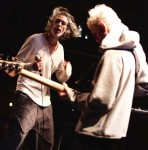Matisyahu draws from the Jewish philosophical ideas found in the Torah and Kabbalah for inspiration when shaping his music. When performing the music, the Grammy-nominated reggae artist said he tries to create an environment in which his audience can connect with their own psyche, emotions and intellect.
In 2016, Matisyahu is performing with special guest Nadim Azzam at 12 colleges across the country hoping to encourage interaction and conversation between Muslim and Jewish student groups. On Tuesday, Matisyahu will bring his improvisational style of music to Schoenberg Hall at a performance organized by Bruins for Israel.
The Daily Bruin’s Meghan Savisaar spoke with Matisyahu about his fusion of musical styles, his improvisational approach to music and what he hopes students will take away from his performance.
Daily Bruin: What messages, spiritually, politically, or otherwise, are you trying to promote through your music, especially in regards to your performances at college campuses?
Matisyahu: The message isn’t so much a concept or an intellectual idea as much as the show itself. I feel that when a person comes to one of my shows and they give themselves over to it, they’ll find something in themselves during the show. It’s not so much an idea that I’m trying to get across like “peace and love,” … it’s creating an environment and a space through the lights, the venue, the music, the people and trying to lead people on some kind of journey into themselves.
DB: Your music spans multiple genres including reggae, rap and hip-hop, but you also incorporate Orthodox Jewish techniques such as a songful prayer. What inspired you to blend modern and traditional sounds?
M: I’m kind of a combiner of things. Like a chemist, I take a little bit of this, a little bit of that from different genres, from different places, and create my own blend, my own mishmash of things.
DB: You stated that when preparing for shows, you don’t have any preconceived ideas for the performance. How long have you been taking this improvisational approach to your music and what inspired you to do so?
M: I became interested in improvisational music when I was a kid, around 16 or 17. I started listening to Phish and that began an interest for me. Over the years I’ve always incorporated that into my live shows. I think that at this stage in my life that’s what I’m mainly interested in, opposed to after 10 years going out and playing the same songs over and over again. It gets kind of tiring. I might play a song if I choose to, but I’m really more interested in the music, what types of music gets made. That goes beyond just playing the parts of a song but about exploring the music.
DB: Why did you decide to tour colleges?
M: This college tour we set up to try to promote interaction between the Jewish and Muslim groups on campuses. It’s sort of like the opposite point of the boycott, divestment and sanctions. Some groups like the BDS are out there and they’re saying that the way to combat something is by boycotting it. We’re saying that we’re not actually trying to combat anything, and the way to gain understanding or try to move forward in terms of the Palestine-Israel conflict is through interaction and conversation, which is quite the opposite of boycotting.
DB: For the students who attend the show, what do you hope that they will take away from the performance?
M: I’m hoping that some of the students come out and they have a real interaction, … that they feel a real connection with their humanity through the music and that will be a building block for them to build and grow a relationship in which they can have discussions, and eventually broaden and expand each other’s perspective.
